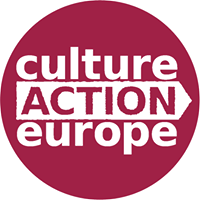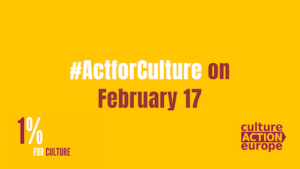 Culture Action Europe (CAE), the European Network of Cultural Centres (ENCC), IETM – International network for contemporary performing arts, and Trans Europe Halles (TEH) have published a joint policy paper on the significance of culture and the arts in non-urban and peripheral areas of Europe. Based on many years of experience, the paper identifies challenges for the many existing and potential projects in those areas, and offer policy solutions to support them.
Culture Action Europe (CAE), the European Network of Cultural Centres (ENCC), IETM – International network for contemporary performing arts, and Trans Europe Halles (TEH) have published a joint policy paper on the significance of culture and the arts in non-urban and peripheral areas of Europe. Based on many years of experience, the paper identifies challenges for the many existing and potential projects in those areas, and offer policy solutions to support them.
Category: CAE
COVID19: Appeal of European Culture NGOs to Governments
 Cultural NGOs in Europe are taking their civic responsibility to mitigate the spread of COVID19 by suspending events and travels. Whether employed or freelance, workers in the cultural sector, who are often in an already precarious situation, are now facing a sudden and dramatic loss of income.
Cultural NGOs in Europe are taking their civic responsibility to mitigate the spread of COVID19 by suspending events and travels. Whether employed or freelance, workers in the cultural sector, who are often in an already precarious situation, are now facing a sudden and dramatic loss of income.
Supporting an appeal by PEARLE* and others they urge all governments to adopt emergency measures that may adequately support the sustainability of the cultural sector.
EU 2021-2027: call for an adequate budget for culture in funding programmes
 In the run-up to the special meeting of the European Council on February 20, 2020 and on the occasion of the #ActforCulture Action Day on February 17, 2020, eight cultural organizations in Germany, coordinated by the European Music Council, made an appeal to Minister of Culture Grütters, Federal Minister of Finance Scholz and Minister of State Roth from the German Federal Foreign Office. The ITI and the IGBK as members of the European Secretariat of German Culture NGOs also signed the call. Continue reading “EU 2021-2027: call for an adequate budget for culture in funding programmes”
In the run-up to the special meeting of the European Council on February 20, 2020 and on the occasion of the #ActforCulture Action Day on February 17, 2020, eight cultural organizations in Germany, coordinated by the European Music Council, made an appeal to Minister of Culture Grütters, Federal Minister of Finance Scholz and Minister of State Roth from the German Federal Foreign Office. The ITI and the IGBK as members of the European Secretariat of German Culture NGOs also signed the call. Continue reading “EU 2021-2027: call for an adequate budget for culture in funding programmes”
“Culture Crops” Report published on CAE-Website
 Culture Action Europe has published an extensive report on its 2019 Beyond the Obvious conference “Culture Crops: cultural practices in non-urban territories”, that took place in Konstanz/ Kreuzlingen end of October 2019. Read the full report of the conference on the Culture Action Europe Website here.
Culture Action Europe has published an extensive report on its 2019 Beyond the Obvious conference “Culture Crops: cultural practices in non-urban territories”, that took place in Konstanz/ Kreuzlingen end of October 2019. Read the full report of the conference on the Culture Action Europe Website here.
The purpose of the Culture Crops conference was to go “Beyond the Obvious”, developing a more comprehensive approach towards culture and cultural and artistic practices in peripheral and non-urban areas. Practically, this included walking the territories, visiting local initiatives and engaging in dialogue with cultural actors from other projects, but with similar challenges from across Europe.
Access to Financial Support for European Non-profit Cultural Organizations at Risk
 Culture Action Europe calls for securing a sustainable future for the European non-profit cultural sector. The statement from November 15 says, that the new application of financial assessment rules “actively prevents organisations in the cultural and creative sectors from accessing EU funding – particularly in specific EU countries where national regulations do not permit non-profit organisations to keep the reserves needed to be rated financially ‘strong’ by the EU – endangering a sizable percentage of cooperation projects and European networks.”
Culture Action Europe calls for securing a sustainable future for the European non-profit cultural sector. The statement from November 15 says, that the new application of financial assessment rules “actively prevents organisations in the cultural and creative sectors from accessing EU funding – particularly in specific EU countries where national regulations do not permit non-profit organisations to keep the reserves needed to be rated financially ‘strong’ by the EU – endangering a sizable percentage of cooperation projects and European networks.”
Following a 2018 introduced new matrix for the financial capacity of cultural organisations, 27 organisations selected for small and large Creative Europe cooperation projects starting in 2019 were assessed as “financially weak” and informed that they would not receive an advance payment for their projects unless they could produce a bank or third-party guarantee.
The European cultural sector is primarily made up of non-profit micro-organisations and is a powerful contributor to each priority of the EU Strategic Agenda 2019-2024. For all future programmes in the fields of culture, education, innovation, youth and sport CAE demands the implementation of a clause according to Regulation no 1288/2013 establishing Erasmus+, Article 19.3: “In addition to public bodies and higher education institutions, organisations in the fields of education, training, youth and sport that have received over 50% of their annual revenue from public sources over the last two years shall be considered as having the necessary financial, professional and administrative capacity to carry out activities under the Programme.”
The matrix for the assessment of the financial capacity of applicants must be reviewed to make sure that programmes are accessible to the full diversity of cultural operators in Europe, which are overwhelmingly represented by micro-entities.
“Culture Crops – Cultural Practices in Non-Urban Territories” Culture Action Europe conference
 From 23-26 October 2019 the Culture Action Europe Conference „Culture Crops – Cultural Practices in Non-Urban Territories“ took place in Konstanz/Kreuzlingen in the German/ Swiss border region. 170 participants from all over Europe debated on cultural practices in non-urban territories: Where does the rural begin and where does it end? What is the difference between urban visions of the rural and what the rural really is today? How does cultural work in peripheral territories take place and how is it organised? Find the detailed program of the conference here.
From 23-26 October 2019 the Culture Action Europe Conference „Culture Crops – Cultural Practices in Non-Urban Territories“ took place in Konstanz/Kreuzlingen in the German/ Swiss border region. 170 participants from all over Europe debated on cultural practices in non-urban territories: Where does the rural begin and where does it end? What is the difference between urban visions of the rural and what the rural really is today? How does cultural work in peripheral territories take place and how is it organised? Find the detailed program of the conference here.
The unusual format, with hikes and visits to cultural sites in Konstanz and Kreuzlingen and the surrounding area – such as Kunstraum Kreuzlingen, the public library and Theater Konstanz, Kartause Ittingen, Transitory Museum of Pfyn, Haus zur Glocke and many more – specifically helped to foster the exchange amongst the cultural actors from all over Europe. Right after the visits, the local hosts discussed challenges in day-to-day work, as well as their questions and wishes to political actors in the European Union, with similar projects from other regions of Europe. Furthermore, an open Project Agora gave space to 26 cultural projects and artists from rural areas all throughout Europe.
The conference participants quickly assembled several theses and demands that were then discussed by the finishing panel, find them here in a first draft:
- Rural voice should be more heard / represented at EU level. At the same time, there is a need for a stronger exchange of the cultural sector with already existing according institutions, such as the European Committee of the Regions.
- Generate links between cultural policy and the cohesion policy strands and develop transversal action.
- In order to create sustainable communities in non urban territories, cultural practices should follow a holistic approach (territorial, cultural, human, economic) that takes into account the autonomy of the community, as well as foster motivation and self-empowerment by being aware of existing local values
- Adopting and diversifying the EU cultural policy is necessary in terms of issues such as scaling of the program, evaluation criteria capacity building, facilitating application processes to reach the goal of truer territorial equity.
- Enable and facilitate exchanges, connectivity, knowledge sharing, information access, cultural and creative practices between rural areas across the EU. Issues to be tackled at the EU level:
- – Gathering of knowledge/data
- – Preservation/transmission of traditional know how
- – Trans-sectorality
- – Long-term actions
- – Capacity to act from local to global
- – Efficiency of local policies/ if compares to EU
An elaboration of this debate and other conference outcomes will be published with a Culture Action Europe policy paper and further documentation on the website of Culture Action Europe in the next weeks.
